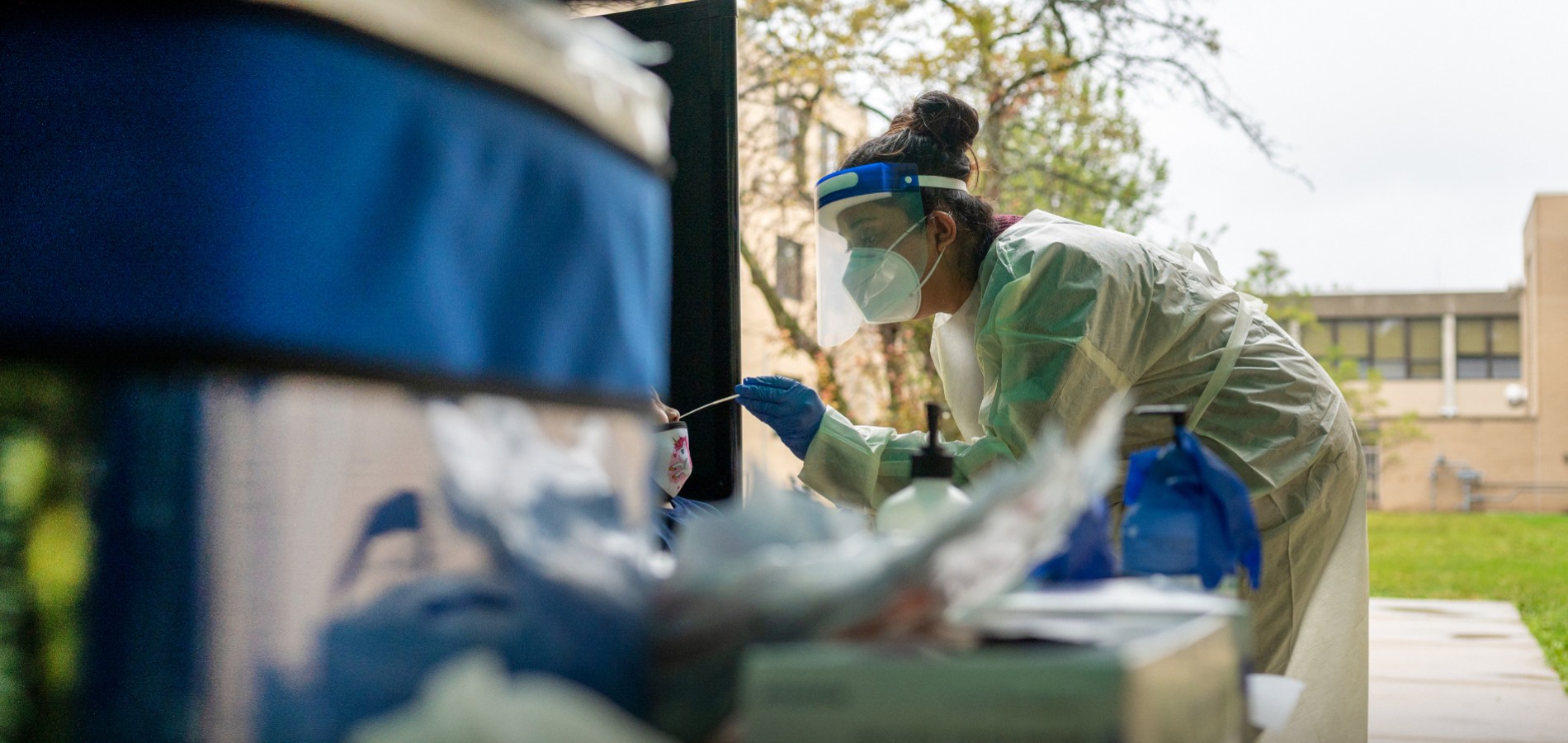
The National Challenge
Stepping Up to Address Covid-19
Science holds the key to conquering the novel coronavirus, SARS-CoV-2, which claimed more than 300,000 U.S. lives by early October. The figure, published by the Centers for Disease Control and Prevention (CDC), includes excess COVID-19-related mortality.
Without science, we could not gauge the outbreak’s true toll, or ask the fundamental questions that help us understand the biology of the virus — how it invades our cells, how it thrives — and apply what we learn to help develop therapeutics and produce vaccines that prevent infections and save lives.
Scientists at Rosalind Franklin University and across the globe continue to work to combat COVID-19, and to publish studies that inform testing approaches and strategies, speed the development of diagnostics and identify promising treatments for clinical trials. Our federal health agencies rely on scientific evidence in updating public health recommendations. It was research that compelled the CDC on Oct. 21 to broaden its definition of “close contact” with a person infected with the virus to 15 minutes of cumulative contact over a 24-hour period. Research led the U.S. Food and Drug Administration (FDA) to approve the first treatment for COVID-19, the antiviral drug Veklury (remdesivir). Research is pushing the need for better screening regimens — inexpensive and rapid point-of-care tests that can capture the virus early and help stop it in its tracks.
As humanity struggles with a pandemic and faces other existential threats, science in the United States has been at risk. The politicization of federal health agencies has contributed to fear and uncertainty. Epidemiological and infectious disease expertise has been undermined and dismissed. Misinformation about potential treatments and cures abounds. The suppression by the federal government of crucial data around race and ethnicity, age and sex, and hospital admissions has clouded our understanding of the trajectory of the pandemic and has slowed implementation of strategies that might limit its spread.
Year after year, federal research funding — rescued this year by a Congress desperate to fight the pandemic — is consigned to the chopping block. Public trust in our institutions continues to erode. A mere 20% of U.S. adults say they “trust the government in Washington to do the right thing,” according to the Pew Research Center.
Meanwhile, first responders and health professionals, including our own faculty and alumni, risk their lives on the frontlines of the pandemic, while scientists work tirelessly to stop COVID-19 and other infectious disease threats, both current and emerging. The university’s effort to increase testing capacity across the region offers an example of the interprofessional, team-based approach that is imperative for management of the pandemic. Strong coordination and interprofessional collaboration among RFU Health Clinics, our community and clinical partners, and our Clinical Immunology Lab within our Center for Cancer Cell Biology, Immunology and Infection have resulted in more than 5,600 tests and some of the fastest turnaround times in our region.
Science-based solutions will ultimately defeat COVID-19. RFU and its scientists will persevere. We will not be deterred from our responsibility to serve, ask critical questions, demand responsible leadership. We will continue to safeguard science and promote a culture that fosters collaboration and respect in the pursuit of discovery and sharing of knowledge. We will continue to urge our elected officials to support strong investments in basic and translational research. And we will continue to seek the support of new and existing philanthropic partners for our scientific community, which continues to work, in good times and in bad, to transform human health.
Trust in Medical Scientists Among U.S. Adults |
Essential Community
RFU Takes on Coronavirus with Rapid Testing.
When coronavirus began to spread aggressively throughout the United States in early 2020, researchers at RFU’s Clinical Immunology Lab (CIL) continued to serve their community the best way they knew how: by offering rapid immunology testing.
When established in 1988, the CIL was a pioneer of research and testing for recurrent pregnancy loss and infertility. Since then, the lab has developed and offered an extensive catalogue of immunology diagnostics, and this year brought with it COVID-19 testing for those who work and study at RFU as well as members of the community. The CIL also services a multitude of clinics throughout the United States and in 30 other countries.
If we had put the full force of science and our economy and the federal government behind testing development, we would be much further ahead.
“When the FDA released the document stating that certified labs can set up COVID testing on top of the testing for public health for communities, we right away ordered the necessary kits, and our staff was already capable of performing those kinds of tests,” said Svetlana Dambaeva, MD, PhD, research assistant professor and CIL associate director.
After testing went live following two months of preparation, one key element to the lab’s success in performing the polymerase chain reaction (PCR) tests was a quick turnaround time — 24 hours, which Dr. Dambaeva said can be compared to a five-day wait for results from other laboratories.
Though the future of the pandemic is hard to predict, one improvement has already arrived: saliva testing, which Dr. Dambaeva described as the next advancement that could propel efforts to curb COVID-19.
According to a research letter posted in October by the CDC, saliva sampling is emerging as an “easy alternative to nasal and throat swabbing” that produces viral loads similar to swabs, is less invasive to the patient and lends itself to rapid results.
COVID Testing at RFU’s Clinical Immunology Lab |
